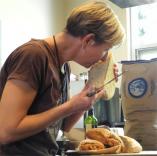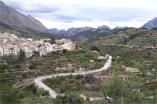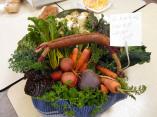Friday morning’s lecture was based on a couple of readings we’d done: one on punk food culture in Seattle, and the other on fast food outlets in China (Of hamburger and social space: Consuming McDonalds in Beijing). A lot of interesting stuff came out of it. We started with Lévi-Strauss’s culinary triangle, which places the concepts of cooked, raw and rotten at its points; the discussion was about what those ideas represented in a counter-culture which had quite naturally (being counter-culture) adopted opposites, so was raw (vegan) instead of cooked (processed, industrialised, omnivorous) and included rotten (foods retrieved from supermarket dumpsters or stolen from markets). And for the second article we talked about it in the context of Sidney Mintz‘s observation that eating differently transforms you – so to eat like an American in Beijing provided a kind of local version of cultural transformation.
In the afternoon we had the second half of the décroissance lecture, and the theories and political actions needed to counteract it. It was a little disappointing to learn there were no simple, effective solutions to a problem that’s been growing since the industrial revolution. The complexity of the economic rat’s nest that holds it all together is not likely to be untangled with a single stroke. Too many vested interests, too many power relationships. A population too tied to the comforts, rules and products of a growth economy, and too unaware or unwilling to see our individual connection to the larger problem.
And an infrastructure that doesn’t support it. It may be possible to live – as I did for 13 years – without a car in a city with a large public transport system; but if you live in a small town, for example, how do you manage? There are towns in every country that have no public transportation, or transportation that runs once a day or less. So people who move to the country to live a healthier life or be greener often find they use their cars far more than they ever did in city life: they are likely to get less exercise than they would in a city where they had to walk between transport stops or were able to use bike lanes rather than risk their lives on narrow country roads. What does that do to the environmental balance I wonder.
And as for downshifting our lives: it all sounds good. We should be wasting less, polluting less, growing more of our own food. But do the people who live in tower blocks have that option or is it reserved for those who can afford the luxury of a house with a garden?
What do we do with all those people living in urban centres, who are there after all because there simply isn’t enough land for them to have their own patch?
Or with those who are a couple of generations beyond having learned to cook their own bread, sew their own clothes or repair furniture –which nowadays is made of self-destruct particle board? Who maybe have to hold two jobs just to pay the rent and feed their children and haven’t the luxury of stepping off the merry-go-round in order to learn how to cook anything from scratch instead of buying frozen pizzas and processed foods, let alone why it should matter to the rest of the world what and how they eat?
We received this interesting link from a Unisg alumnus: What the World Eats is somewhat terrifying when you look at the amount of processed and packaged foods on everyday tables around the world.
Well, on with the show. Today we have a first meeting with Barny Haughton, of Bordeaux Quay, Bristol, talking about culinary techniques; later in the week we’ll have the Austrian-born American physicist (author of The Tao of Physics) Fritjof Capra.









